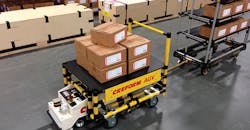New ways to manage the shipper-carrier relationship
Editor’s note: This is the fourth part of a series on how shippers and carriers are working together in the modern freight world. Read Part 1, Part 2, Part 3 and Part 5.
Thanks in large part to technology, carriers and shippers are putting aside their traditional across-the-table negotiations in favor of addressing common problems together. This shift has the potential to spin off big benefits for everyone along the supply chain and just in the nick of time, too. There are more than enough big challenges to share, such as:
- Chronic driver and technician shortages.
- The capacity and cost issues tied to mandated electronic logging.
- Traffic gridlock on an aging highway system.
- Mandated constant cargo tracking, monitoring and reporting for temperature-sensitive freight such as food.
- The “I want it now” shipping and delivery frenzy occasioned by e-commerce.
- A lack of parking spaces for long-haul vehicles.
- Tighter load/unload expectations at busy terminals and docks.
The transformation to dynamic and collaborative freight management taking place today did not all begin overnight, of course. “Just-in-time delivery” was a buzzword years ago — an early point of pressure on shippers and carriers alike. It was a strategy designed to help reduce the need for maintaining large inventories of parts or products where they could be quickly accessed by the factories, services, wholesalers, or retailers that might suddenly want them.
If you compare the disruption occasioned by the advent of just-in-time delivery to this present list of challenges, however, it seems almost simple. After all, today’s pressures are all being felt at the same time, day in and day out. What is more, each new challenge tends to amplify the impact of other challenges.
This is the fourth part of a series on how shippers and carriers are working together in the modern freight world. Read Part 1, Part 2, Part 3 and Part 5.
About the Author
Fleet Owner Staff
Our Editorial Team
Kevin Jones, Editorial Director, Commercial Vehicle Group
Cristina Commendatore, Executive Editor
Scott Achelpohl, Managing Editor
Josh Fisher, Senior Editor
Catharine Conway, Digital Editor
Eric Van Egeren, Art Director
